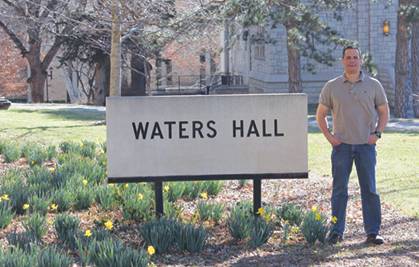Villoria receives Fulbright U.S. Scholar Award to Brazil
The U.S. Department of State and the Fulbright Foreign Scholarship Board are pleased to announce that Nelson Villoria, associate professor of agricultural economics at Kansas State University, received a Fulbright U.S. Scholar Program award to Brazil.
 Villoria will work with colleagues at the Escola Superior de Agricultura Luis de Queiroz (ESALQ), Universidad de Sao Paulo as part of a project to understand the role of Brazil’s farmers and agribusinesses on reducing deforestation. The study is a part of a broader effort investigating the conditions under which supply chain actions can help to reduce deforestation.
Villoria will work with colleagues at the Escola Superior de Agricultura Luis de Queiroz (ESALQ), Universidad de Sao Paulo as part of a project to understand the role of Brazil’s farmers and agribusinesses on reducing deforestation. The study is a part of a broader effort investigating the conditions under which supply chain actions can help to reduce deforestation.
“Deforestation is a major cause of biodiversity loss and the second largest contributor to global greenhouse gas emissions after fossil fuels. Proposed legislation in the US, the European Union, and the United Kingdom to curb tropical deforestation relies on policies that assume that agribusiness corporations can use their market power to compel farmers in the tropics to change production practices. Soy is central to these policies as it drives land clearing in Brazil, the world’s main soy producer and host of large vulnerable ecosystems. Yet, with strong competition for soy among actors with different environmental priorities, it is an open question whether the current structure of soy markets is compatible with the intended policy objectives,” stated Villoria. “I am thrilled to have this opportunity to work with the faculty and researchers at ESALQ. This project will identify the incentives needed for corporate policies in Brazil’s soy sector to reduce forest loss and will provide a framework to study other forest-risk commodities in the tropics.”
As a Fulbright Scholar, Villoria will share knowledge and foster meaningful connections across communities in the United States and Brazil. Fulbrighters engage in cutting-edge research and expand their professional networks, often continuing research collaborations started abroad and laying the groundwork for forging future partnerships between institutions. Upon returning to their institutions, labs, and classrooms, in the United States, they share their stories and often become active supporters of international exchange, inviting foreign scholars to campus and encouraging colleagues and students to go abroad. As Fulbright Scholar alumni, their careers are enriched by joining a network of thousands of esteemed scholars, many of whom are leaders in their fields. Fulbright alumni include 60 Nobel Prize laureates, 88 Pulitzer Prize recipients, and 39 who have served as a head of state or government.
“The Agricultural Economics Department is pleased that Dr. Villoria was selected for the Fulbright U.S. Scholar Program,” Dr. Allen Featherstone, professor and department head, said. “This is a great opportunity for him to meet with farmers and agribusinesses in Brazil to better understand deforestation. Nelson will bring all of that knowledge and research back to K-State to share with students, faculty and producers in Kansas and around the nation.”
The Fulbright Program is the U.S. government’s flagship international educational exchange program and is supported by the people of the United States and partner countries around the world. The Bureau of Educational and Cultural Affairs is pleased to announce that 2021 marked the 75th Anniversary of the Fulbright Program.
Since 1946, the Fulbright Program has provided more than 400,000 participants from over 160 countries the opportunity to study, teach and conduct research, exchange ideas, and contribute to finding solutions to shared international concerns. The primary source of funding for the Fulbright program is an annual appropriation by the U.S. Congress to the U.S. Department of State’s Bureau of Educational and Cultural Affairs. Participating governments and host institutions, corporations and foundations in foreign countries and in the United States also provide direct and indirect support.
